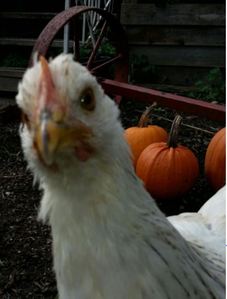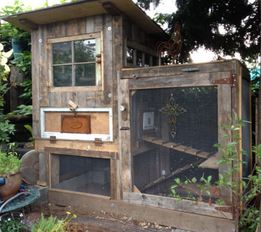Our Urban Chickens

Chickens are a great addition to any urban back yard. We really wish we had got them sooner. Adding them to our garden has been an incredible and rewarding experience. There are the obvious benefits of fresh tasty eggs for our breakfast table and manure for the compost and garden but they are also a great natural pest control – eating up insects and slugs, devouring weeds and weed seeds. We let them peck and scratch through the garden once we have finished harvesting our crops to prepare for the next crop but most of all we love having chickens because there is deep connection to nature that they bring to our life. All the benefits of therapy without the bills.
Chickens are inexpensive and don't take very much time. However you may find, like we have, that you end up spending quite a bit of time with them because of the simple pleasure they add to your life. Chickens are not solitary animals and if your going to have them it is recommend to have 3 or 4, which is generally allowable in urban areas. You do not require a rooster for your hens to lay eggs, roosters are only required if you want fertilized eggs for hatching. To my knowledge no city allows roosters in urban areas. As for egg production they lay an average of 2 eggs every 3 days, although their yield vary depending upon variety and diet. Hens start laying at about 5 or 6 months and are in peek production until about 2 years old when there egg production starts to decrease.
Chickens are inexpensive and don't take very much time. However you may find, like we have, that you end up spending quite a bit of time with them because of the simple pleasure they add to your life. Chickens are not solitary animals and if your going to have them it is recommend to have 3 or 4, which is generally allowable in urban areas. You do not require a rooster for your hens to lay eggs, roosters are only required if you want fertilized eggs for hatching. To my knowledge no city allows roosters in urban areas. As for egg production they lay an average of 2 eggs every 3 days, although their yield vary depending upon variety and diet. Hens start laying at about 5 or 6 months and are in peek production until about 2 years old when there egg production starts to decrease.

You can purchase a simple coop for about $500 or spend $1000 or more for a deluxe coop. I recommend doing like we did and and build one yourself - add your personal touch. We built our stylish coop out out of salvaged material and repurposed items - it cost only $50 for the metal mesh. It is worth spending time to make your coop attractive - ours has become a focal point of our yard which has only made having our chickens even more enjoyable.
Our three week old chickens were under $10 each. You can purchase chickens at a day old but we picked ours up at three weeks old. Its easy to lose day old chickens and costs only a few dollars more to purchase 3 week old so its easily worth the extra money. Urban farmers should always buy sexed chickens as you don't want to have to deal with the prospect of getting rid of of a rooster. - especially if you have kids. You don't want the kids becoming attached to a a rooster that you will need to get rid of. Feed is cheap you can also feed them most kitchen scraps. Aside from that there is a nominal cost for pine shavings, chicken scratch as a treat and oyster shells to help harden the egg shells and aid in digestion.
Some common concerns are:
The biggest issue to consider I think is that chicken live on average 5-8 years (some even longer) but are only at peek egg laying production for about 2-3 years. This doesn't mean they stop producing eggs it only means they are not as productive. Some people claim that while they lay fewer eggs they are generally larger – I haven't had chickens long enough to know. Some urban farmers use their chickens as stew meat after a year or two when production starts to decrease and while the idea of organically raised chicken is tasty I suspect most people will fall to their charms like we have and find eating them unimaginable.
Do some reseach and decide if chickens are right for your family - we did and are happy to have added them to our garden!
Our three week old chickens were under $10 each. You can purchase chickens at a day old but we picked ours up at three weeks old. Its easy to lose day old chickens and costs only a few dollars more to purchase 3 week old so its easily worth the extra money. Urban farmers should always buy sexed chickens as you don't want to have to deal with the prospect of getting rid of of a rooster. - especially if you have kids. You don't want the kids becoming attached to a a rooster that you will need to get rid of. Feed is cheap you can also feed them most kitchen scraps. Aside from that there is a nominal cost for pine shavings, chicken scratch as a treat and oyster shells to help harden the egg shells and aid in digestion.
Some common concerns are:
- Am I even allowed to have them? More and more municipalities have bylaws allowing for people to keep chickens in an urban environment. Its not always easy to find out the rules in all municipalities but generally as long as your neighbours are fine with it there aren't any problems and generally neighbours are easily swayed with a few fresh eggs from time to time. The City of Vancouver’s bylaw gives you a great idea about the basic requirements required for raising urban chickens and provides some useful links.
- Will they attract rats, skunks and raccoons? Not if you build a secure co-op. Use 1/2” steal mesh for the co-op and bury it 12” deep or use a brick or a steal mesh floor to keep the pests from getting in by tunneling in. I've used steal mesh for the floor also – this way there is very little chance anything could get in.
- Will they smell? Not if you keep the coop clean. Generally the hen house stays quite clean – especially if you use a poop catcher. The coop needs a quick cleaning every week (quick scraping of manure of perches and ledge)s and a more thorough cleaning once a month. We use pine shavings to help keep the coop clean and help absorb the smell. Flies can be an issue in the summer but we have a glass fly catcher on top of the coop and it does a great job - it also catches wasps and hornets but doesn't attract our honey bees.
- What about the avian flue? It is possible but highly improbable – small isolated flocks are less likely to be in situations where they will be exposed potential risks. Urban chickens, like ours, are raised in much better conditions than modern factory farms and are stronger and healthier and therefore less susceptible to disease. The factory chicken industry likes to blame breakouts of the avian flue on wild birds coming in contact with small flocks of free range birds but the science is self serving.
- How much of my time will they take? Not as much as you'd think but if you're like us you'll find out that you end up spending quite a bit of time with them. They are memorizing to watch peck around but really only need a few minutes or less a day plus 10-15 minutes once every couple of weeks to clean the coop. A well built coop will keep critters out so you don't have to be there to let them out and put them in every day. Feeders and waters can provide the needs of the chickens for a few days – so your not as tied to the old homestead as one might think and some suggest. The biggest issuewhile away is keeping up on harvesting the eggs and its usually pretty easy to find someone to come get a few fresh eggs every couple of days!
- Are they loud? Hens do cluck around a bit and can be somewhat noisy when they are laying their eggs which is usually in the morning or early afternoon but they are generally quite quite. Rosters aren't allowed in any municipalities that I know of and they are the ones that really make noise. Personally we find their noise of our chickens is quite peaceful and relaxing. They are definitely a lot quieter than a barking dog.
- How will they get along with my pets? It really depends on your pet. Our 4 year old black lab 'Sadie' gets along great with them. The biggest concern we have is trying to keep the dog from eating small bird droppings. We introduced our chickens to Sadie when we first brought them home at 3 weeks old and she quickly realized they were part of the family – we've never had any issues. You still need to be cautious of stray cats and other peoples dogs but we haven't had any issues with our dog (or our bees for that matter)
The biggest issue to consider I think is that chicken live on average 5-8 years (some even longer) but are only at peek egg laying production for about 2-3 years. This doesn't mean they stop producing eggs it only means they are not as productive. Some people claim that while they lay fewer eggs they are generally larger – I haven't had chickens long enough to know. Some urban farmers use their chickens as stew meat after a year or two when production starts to decrease and while the idea of organically raised chicken is tasty I suspect most people will fall to their charms like we have and find eating them unimaginable.
Do some reseach and decide if chickens are right for your family - we did and are happy to have added them to our garden!
